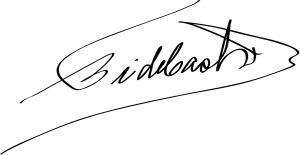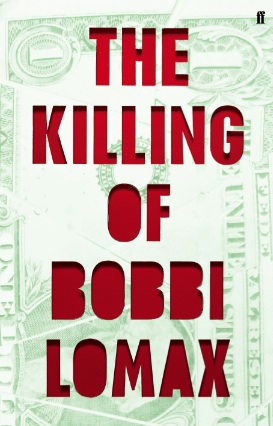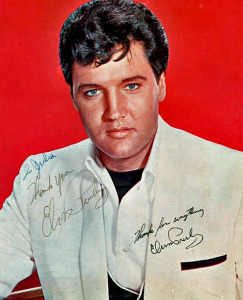Sign here
by Cal MoriartyRicky Gervais, Charles Dickens and Washington Irving probably don’t have much in common except for their mutual loathing of autograph hunters, or as they are described in the US autograph hounds. In his stand-up tour Science, Gervais said they are the “bane of my life”, Dickens reportedly referred to them as a “nuisance” and Irving was even less impressed, cuttingly referring to them as the “mosquitoes of literature”. But what could have turned the innocent, rarified early 19th-century pursuit of ‘signature collecting’ into something to attract such hostility? Well, money. And lots of it.
Internationally the autograph and signed memorabilia trade has become a multi-billion dollar business. And, according to the FBI, at least 70%, if not 90% of this material consists of forgeries. Someone, somewhere is making an awful lot of money spinning gold from air. That said, at least 10% of the current market is legitimate and also extremely lucrative, with individual autographs often attracting thousands of pounds in private sales and in auction rooms around the globe. According to the 2014 edition of Paul Fraser Collectibles’ PFC40 Autograph Index, Fidel Castro’s signature, presumably because no one can get past his security detail, is the most valued of any living personality at £3,750, followed by Sir Paul McCartney at £2,500. James Dean’s, the most prized of the dead celebs because his death at just 24 after being famous for such a short time, is valued at £18,000.
Early autograph hunters sought out historical and literary figures, but it became a popular hobby amongst all classes in the early 20th century at major sporting events and with the advent of Hollywood, radio and TV and, in the 1950’s, the emergence of the popular music scene. Suddenly, everyone could grab an autograph from a popular figure after a screening, a gig or a game. The internet has also had a major impact, enabling collectors to deal internationally without having to list items for sale with major auction houses. Public demand seems almost insatiable.
To forge anything longer than a signature is quite the undertaking, and most definitely not in the average forger’s skill-set.”
But it’s not just signatures on pieces of paper, photos or albums that are worth money. In fact, signatures on books, documents, sporting memorabilia, war artifacts and musical instruments have even greater value. In my novel The Killing of Bobbi Lomax, forger Clark Houseman takes a simple first-edition Edgar Allan Poe collection and increases its value 50-fold by adding a forged dedication and signature to it. But to forge anything longer than a signature is quite the undertaking, and most definitely not in the average forger’s skill-set. In order to accomplish such a forgery, and pass it off as an organic part of Poe’s life, forgers must know an awful lot about the life and movements of their subject. They must also research and perfect the creation of ink and, often, paper used in that particular era in order to fool those tricksy carbon-dating machines (technology that wasn’t available until the mid-1980s). Manuscript or document forgery is difficult, time-consuming and exposes the perpetrator to great risk including jail time. But with some rare documents selling for millions at auction, forgers feel the risk is worth it. Comparatively, autographs are a lot easier because a basic skill in forgery can quickly net the miscreant a lot of money.

To customise your own Fidel Castro souvenir, simply paste this signature onto the item of your choice (not for resale, obviously)
In 2000, the FBI, in Operation Bullpen brought down a nationwide criminal forgery gang run by father-and-son team Angelo and Greg Marino. Greg later admitted that he personally forged over a million autographs. A million. One of their specialities was producing ‘vintage cuts’, basically an autograph ostensibly cut out of another document and showing just the signature. Until Greg and Angelo began forging vintage cuts rarely existed on the market. Now they are everywhere and, again, very few are actually genuine. Their presence in the market also exponentially reduces the value of genuine autographs, because the rarer the signature the higher the market value. During the raid the FBI seized US$10m in forged items, including 10,000 baseballs signed by sports stars and also, incongruously, several signed by Mother Teresa.
As the internet further takes over our lives there will be less personal correspondence generated, and the focus for autographed material for novice collectors and forgers alike will move away from books and music albums to tour and sporting memorabilia. As Taylor Swift said in an OpEd piece for the Wall Street Journal, the selfie is fast becoming the new autograph: if so, prepare for an explosion in Photoshop shares as fans unable to meet their hero in person improvise a meeting. As the post-internet autograph market shifts its focus, the value of signed documents, books, manuscripts, letters, albums, etc. will increase exponentially. So, if you have those items and know them to be genuine, hold onto them. They will only rise in value as the signed memorabilia market becomes a muddy miasma of ‘is it, isn’t it?’. Just because you have an autograph from a world-class sports personality accompanied by a picture of him or her signing something doesn’t mean that what you have in your hand is a) what they signed, or b) genuine. Forgers have been known to pay sports personalities to sign hundreds of genuine autographed items and then to add these genuine items to thousands of fakes. They include with each sale item a photograph of the signing event to fool collectors into paying not insignificant sums.
It’s not just novice collectors who are fooled by forgers. Famously in the 1980s The Sunday Times, Stern and Newsweek bought ‘The Hitler Diaries’ for millions of dollars. If only the editors had asked the really obvious question of how Hitler would have had the time to write sixty leisurely volumes of diaries whilst waging a world war, they might have saved their jobs and a lot of embarrassment.
If you are thinking of beginning an autograph collection, the golden rule is that you should research your subject closely and, if it’s cheap, then go ahead, take a punt, but be extremely realistic about its potential future value. Treat your investment just like a gamble on a horse race. If nine out of ten horses in the race are losers, only one can be the winner. You might gamble on the winner. But if the item’s costing anything more than about £20, you should probably release your inner cynic and bloodhound. Remind yourself that just because it doesn’t say George Washington or Marilyn Monroe on that document, it doesn’t mean to say that no one would take the time to forge the signature. In fact, lesser-known personalities are preferable for a low-stakes forger as the style of their signatures is less well known, and the lower asking price is less likely to attract expert scrutiny.
My personal adage when collecting items is always go to a good dealer (even this is not without risk, but there’s less of it). Or ideally, track your hero down at an event near you and ask them to sign your treasured item for you – that is the one guaranteed way of authenticating it, you actually see them writing in front of you. If they think you’re a trader they’ll refuse, so don’t bring more than one or two items with you, and be prepared to wax lyrical about your hero’s amazing work or feats, rather than just shoving an item in their face and demanding a signature. And remember above all else: caveat emptor. Because that Elvis signature you found at a Chingford car boot sale probably isn’t worth the paper it’s written on.
 Cal Moriarty is the creator and author of the ‘Wonderland’ series of novels, of which the first The Killing of Bobbi Lomax is now published by Faber & Faber Crime and longlisted for the CWA’s John Creasey New Blood Dagger. She also writes for film and theatre, and previously worked as a private eye. Read more.
Cal Moriarty is the creator and author of the ‘Wonderland’ series of novels, of which the first The Killing of Bobbi Lomax is now published by Faber & Faber Crime and longlisted for the CWA’s John Creasey New Blood Dagger. She also writes for film and theatre, and previously worked as a private eye. Read more.
@calmoriarty



